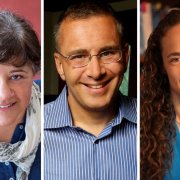MIT professors Sabine Iatridou, Jonathan Gruber, and Rebecca Saxe have been selected to pursue their work “under the freest possible conditions.”
Julie Pryor | McGovern Institute for Brain Research
MIT faculty members Sabine Iatridou, Jonathan Gruber, and Rebecca Saxe are among 175 scientists, artists, and scholars awarded 2020 fellowships from the John Simon Guggenheim Foundation. Appointed on the basis of prior achievement and exceptional promise, the 2020 Guggenheim Fellows were selected from almost 3,000 applicants.
“It’s exceptionally encouraging to be able to share such positive news at this terribly challenging time” says Edward Hirsch, president of the foundation. “A Guggenheim Fellowship has always offered practical assistance, helping fellows do their work, but for many of the new fellows, it may be a lifeline at a time of hardship, a survival tool as well as a creative one.”
Since 1925, the foundation has granted more the $375 million in fellowships to over 18,000 individuals, including Nobel laureates, Fields medalists, poets laureate, and winners of the Pulitzer Prize, among other internationally recognized honors. This year’s MIT recipients include a linguist, an economist, and a cognitive neuroscientist...
...Rebecca Saxe is an associate investigator of the McGovern Institute and the John W. Jarve (1978) Professor in Brain and Cognitive Sciences. She studies human social cognition, using a combination of behavioral testing and brain imaging technologies. She is best known for her work on brain regions specialized for abstract concepts such as “theory of mind” tasks that involve understanding the mental states of other people. She also studies the development of the human brain during early infancy. She obtained her PhD from MIT and was a Harvard University junior fellow before joining the MIT faculty in 2006. Saxe was chosen in 2012 as a Young Global Leader by the World Economic Forum, and she received the 2014 Troland Award from the National Academy of Sciences. Her TED Talk, “How we read each other’s minds” has been viewed over 3 million times.
“As we grapple with the difficulties of the moment, it is also important to look to the future,” says Hirsch. “The artists, writers, scholars, and scientific researchers supported by the fellowship will help us understand and learn from what we are enduring individually and collectively, and it is an honor for the foundation to help them do their essential work.”
Read the full article on the MIT News website using the link below.

